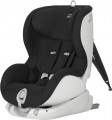i-Size
The car seat meets the requirements of the European safety standard
i-Size (ECE R129). Within the framework of this standard, it is assumed that child car seats are classified according to the height and age of the child, and not by weight (as was previously the case). It is also mandatory to fasten the retaining device using the Isofix system (see “Isofix fastening”). In accordance with i-Size requirements, car seats must be installed rear-facing until the child is 15 months old or reaches a height of 105 cm. All i-Size certified car seats must pass a side impact test. Chairs and cars that meet the requirements of the standard are marked i-Size, which confirms their full compatibility.
Correct installation indicator
The presence in the design of the child restraint system of special
indicators of correct installation. They help ensure that the child car seat is installed correctly and follows all prescribed safety guidelines. Most often, such indicators are represented by special marks that change color or position when the car seat is installed correctly. Such indicators are placed on Isofix system locks, seat belts for fastening a child, etc. And some models for the youngest passengers have built-in levels or angle indicators that help set the seat in the correct position, facing the rear of the vehicle.
Equipment
—
Isofix base. The product is equipped with a separate Isofix base, which is fixed in the interior of the car on the appropriate fixing clips, and the car seat is installed directly on it. The use of the base provides reliable fixation of the car seat and reduces the risk of its incorrect installation. On the Isofix base are installed mainly car seats of age groups 0+ and 1, some models assume the possibility of placing seats for older kids. It should be noted that car seat models
without an Isofix base are also widely available on the market.
—
Removable cover. Removable car seat cover for cleaning and/or washing. This function is especially useful if the seat is used when feeding a kid.
—
Anatomical cushion. Depending on the age group, it can either be a special horseshoe-shaped cushion to support the kid's head (for the youngest ones who are still unable to hold their head on their own), or a special soft headrest that fixes the head from behind and to the sides (for older kids).
—
Armrests. Armrests refer to the handles placed on the sides of a seat where one can rest their elbows and forearms. They reduce fatigue in the neck and shoulders of a child during prolonged sitting.
—
Sun canopy. Plastic (most often) canopy to protect the kid fro
...m the sun or bright light.
— Foot cover. A cover that covers the kid's legs and lower body. It is used in seats of age group 0.
— Cup holder. A device used in car seats to hold a bottle of drink or formula for feeding. Most often done removable.Additional side protection
The car seat has structural elements that further protect the child from side impacts. At least such elements include sidewalls for head protection made of impact-absorbing material such as polyurethane foam; torso protection may also be provided. If you are looking for a car seat with the maximum level of protection, you should choose from models with
additional side protection.

